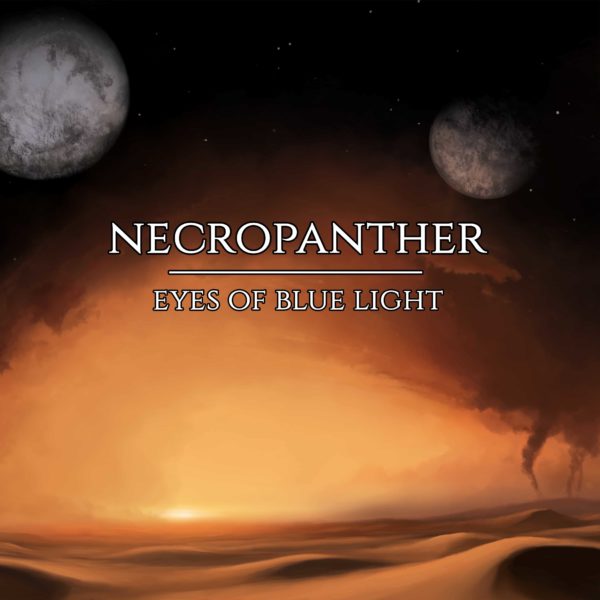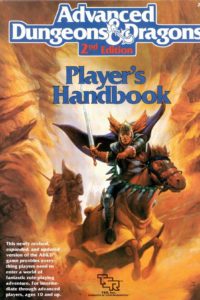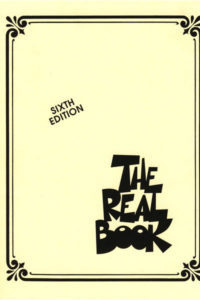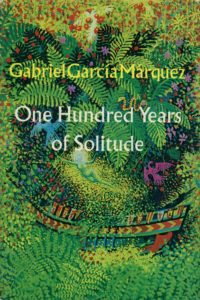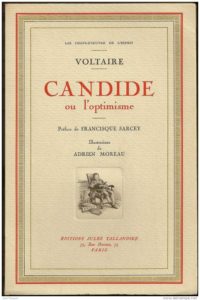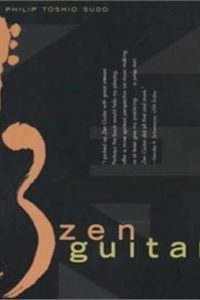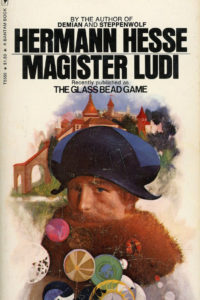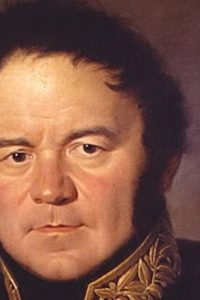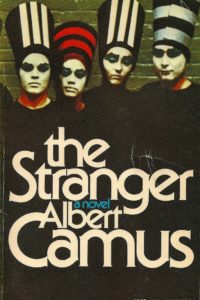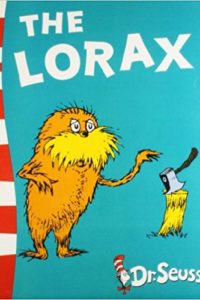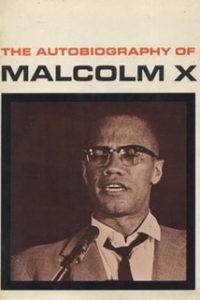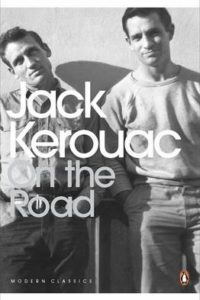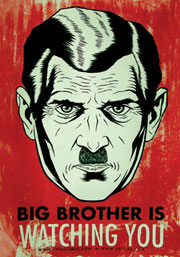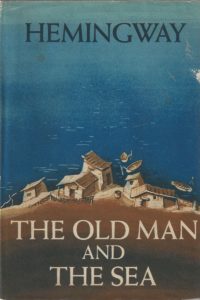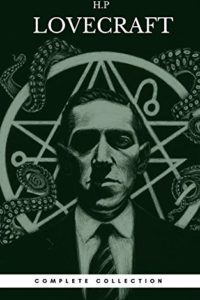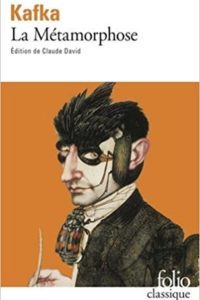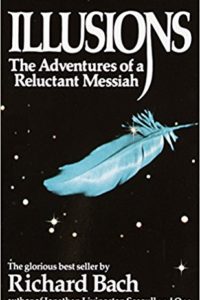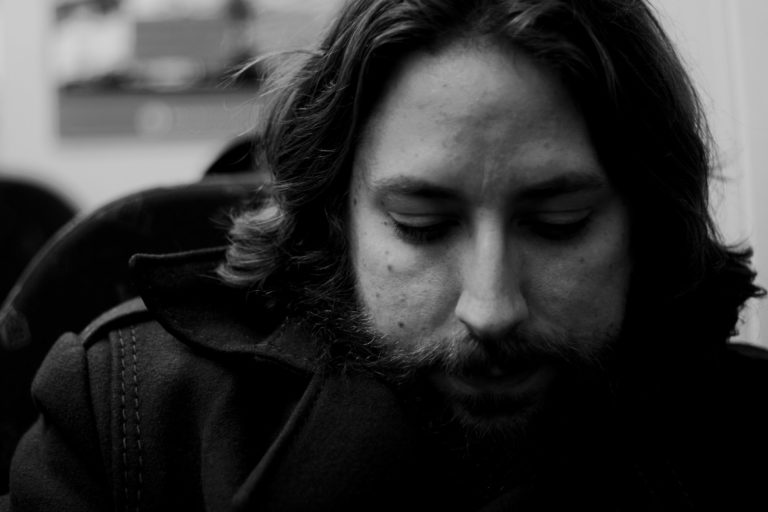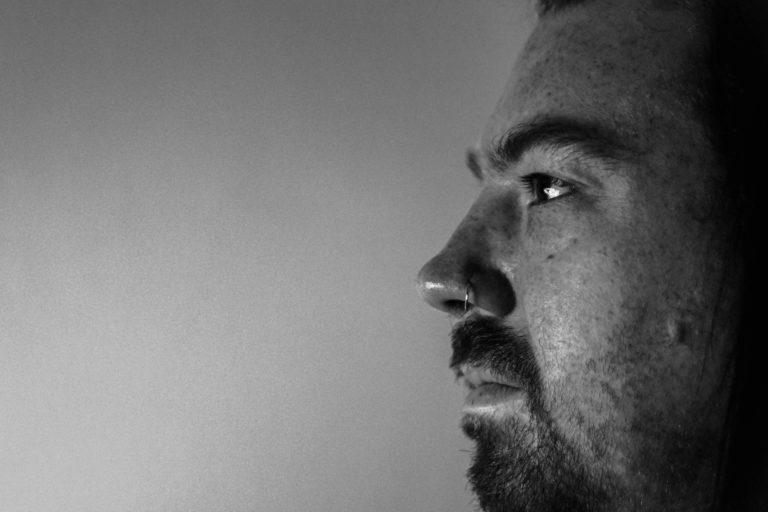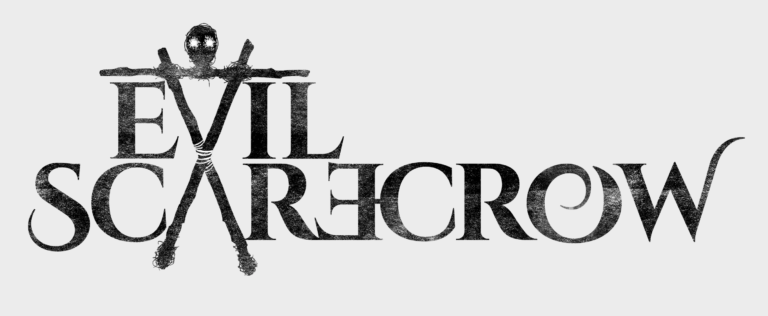Necropanther describe their music as ‘short, thrashy death metal songs from a dystopian future.’ The Denver-based four-piece are technical, melodic, super-heavy and super-creative, and they released one of my favourite albums of this year, Eyes Of Blue Light. Any Dune fan will recognise this reference from the classic sci-fi novel by Frank Herbert, and in fact, the whole album is about Dune. So I had an inkling this was a literary bunch of metal musicians… and I was right. Lead guitarist Joe Johnson and bassist Marcus Corich have put together two fascinating reading lists, which give us an insight into the influences that make up Necropanther. Check this out, and then go listen to their music!
Joe Johnson, Necropanther lead guitarist
I found this a deceptively challenging prompt. There are a handful that are automatic and obvious, such as Dune, which inspired Necropanther’s Eyes of Blue Light album. Completing the list required staring at my book shelf in the manner of Norman Rockwells museum patron encountering abstract expressionism for the first time.
1. Advanced Dungeons and Dragons Player’s Handbook, 2nd Edition, by David ‘Zeb’ Cook. This book defines role playing as ‘interactive storytelling’ and encourages your imagination to build a narrative world that is fantastic, yet plausible, by collaborating according to an agreed-upon rules framework. I’m still not sure whether it’s just a game.
2. The Real Book, by Hal Leonard Corp. I learned scales, modes, and chordal harmony by playing standards out of this when I was a kid. I have yet to master being a hip and classy jazz guitarist. On the other hand, have I mastered being hip and classy at anything?
3. One Hundred Years Of Solitude, by Gabriel Garcia-Marquez. This is a beautiful rendition of a story that anyone can enjoy, but the actual content of the art is different than the content of the story. This was maybe the first time I realized that about narrative fiction. I appreciate that while ‘magic realism’ is a deficient phrase, it’s also descriptive.
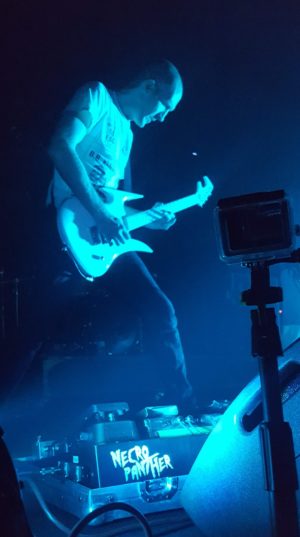
4. Groundwork of the Metaphysic of Morals, by Immanuel Kant. Sure, this is not a book to curl up with on a cozy winter night. It considers self-discipline, and it’s written for an audience that wishes to behave ethically in the modern world. For Kant, you can only be certain of the ethics of your position when it is contrary to your personal interests. When you do the right thing because you want to, a doubt will always remain. What Is Enlightenment is another all-time classic.
5. Candide, by Voltaire. Never allow an authority to tell you that things are going well. Always interrogate the received knowledge. V0ltaire is the person from history whom I would most like to have met, though not entirely because of this book. He recognized the absurdity of his time. Who among us can claim that?
6. Zen Guitar, by Philip Toshio Sudo. I read this after Scotti Hill mentioned it. An easy read with durable insights:
- Put on a white belt and start practising
- When the belt is filthy from effort, you have a black belt
- Keep practising
- When your belt is pale from wear, you are a white belt again
Beginner’s mind. The artist is the child that survived.
7. Norton Anthology Of Poetry, 4th Edition, by Margaret Ferguson and Mary Jo Salter. I believe in the idea of the canon, that the best art is fundamentally not a matter of debate. Appreciating it is its own reward, and misunderstanding it is its own punishment. If you write a good enough poem, it ends up here. I’m sure that the later editions are also good, but this it the one that I keep around.
8. Magister Ludi: The Glass Bead Game, by Hermann Hesse. A thrilling narrative of the experience and considerations of making art. Blissfully abstract. It’s trivial to find an obscure corner of the game that no one has explored yet, and to inhabit your life by assembling trinkets there. The greater challenge is to hold the center. We value clarity of expression in subjects that are of universal interest. TRVE KVLT black metal can be good. AC/DC is better.
9. The Red and the Black, by Stendhal. The first psychological novelist and perhaps the first modern artist, Stendhal was aware of the impact of his art upon the world and, like Voltaire, adopted a mononym. The Red and the Black is a story of ambition and ambivalence. People who are good at more than one thing wake up in the morning and wonder who they are going to be. The authorities of the world are free from any such burdens.
10. The Stranger, by Albert Camus. Like Descartes, Camus considers what we are capable of understanding about our existence. Unlike Descartes, Camus considers what happens when we take action. The world itself and our consequences form a void that will provide no satisfactory answer. Nihilism is a logically consistent and defensible response to the situation, but there are clearly responsible people, cowards, users, and victims. Nihilism permits no value judgements, and so, like denying the canon, it serves as its own punishment. Part of the challenge of life is to recognize the void and then to create an order and meaning of your own while maintaining logical consistency. It’s increasingly important to interrogate the role of racism in this book, as with many artefacts of the 20th century.
11. Dune, by Frank Herbert. Eleven. In the great tradition of Nigel Tufnel, I cheated. The AD&D Handbook says that only that you must agree to the framework. The Real Book allows that deviations are acceptable, often in upper extensions. I have agreed to the framework and broken it, as you might do in an improvisation on a jazz standard.
I read Dune on a dare in seventh grade because it was the thickest book in the school library. I ended up reading it every year for the next five years and a few more times again as an adult. It would be impossible to encapsulate what Dune has meant to me, but here are a few key features:
- The hero is what’s known as a competent man archetype – a man who is good at everything, like James Bond or Flash Gordon. Competent man heroes normally appear fully-formed when the action begins. Paul Atreides becomes Muad’Dib through training and application of technique. Dune is therefore a manual for becoming super-human.
- The competent man usually lacks internality (except perhaps suspicion or plans about what to do next). Dune has an omniscient narrator that vivisects the characters’ beliefs and motivations, including Paul’s questions about his role in the world.
- Although it’s a utopian forward looking narrative with an uplifting message about human survival in the universe, it doesn’t flinch from mankind’s self-serving frailties and factional characteristics. As Mozart’s father advised, “all men are villains.”
- The book is an allegory for contemporary politics and hints, like 2001: A Space Odyssey, that humanity is unlikely to transcend our squabbling, regardless of the available resources. In fact, greater resources lead to overwhelming greed.
- The epigraphs, songs, and broken allusions throughout hint at much larger world. In this way, it mirrors our experience of life and illustrates the importance of culture and cultured people around us, even when they may be our adversaries.
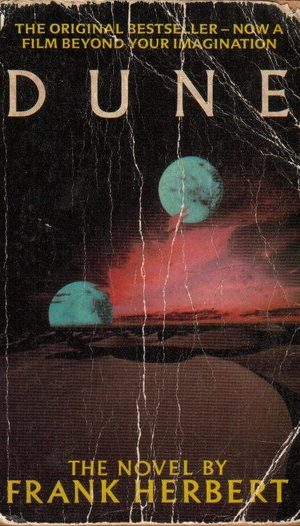
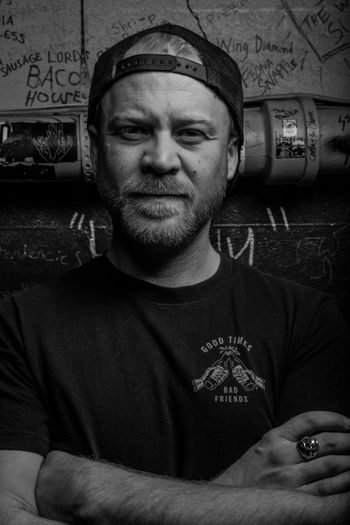
Marcus Corich, Necropanther bassist
This is a tough list to whittle down. A multitude of different reads have contributed in shaping my person, from poems to short stories, comics to biographies, memoirs to articles. Here is my best shot at the ten biggest pieces to the puzzle.
1. The Lorax, by Dr. Seuss. I don’t care what anyone says, autor-artists like Dr. Seuss and Bill Watterson are awesome. I first read this book at a very young age but I’ve remembered it well for decades. This book is ostensibly made to be appealing to and palatable for young children but any work that can resonate with individuals of any age has a hidden immensity of worth. It is simultaneously fun. To me, there is no reason art shouldn’t be fun.
2. Shakespeare’s Sonnets, by William Shakespeare. The first time I read Shakespeare I had a really difficult time, I couldn’t believe that so many people had devoted so much time and energy and had successfully understood deeply the writings of Shakespeare. I took it as a challenge and tried hard to learn about poetic scansion, metaphor, imagery, and Elizabethan English. And honestly it’s still challenging, but the work is the reward. This collection of poetry is my de facto favorite because of the challenge it represents and my enjoyment of the Sonnet form.
3. The Autobiography of Malcolm X, As Told to Alex Haley. This book was for me a huge step outside of myself. Incredible stories of strife, violence, social and religious ostracization and marginalization I’ll never know told by a magnificent speaker and writer. I enjoy biographies and this particular one is supremely compelling. An amazing read from a human perspective.
4. Fear and Loathing in Las Vegas, by Hunter S Thompson. I imagine Thompson is an author ranked highly on most people’s lists and for good reason. His style and voice are inimitable and combined with Ralph Steadman’s illustrations they create an amazing artistic product that’s maniacal, frantic, powerful and fun. A classic read like Kerouac about an excursion through America’s changing landscape, except told by a drug crazed yet contemplative master of prose. A work that stokes me artistically and mentally.
5. On the Road, by Jack Kerouac. A story written in the same Gonzo-esque vein as Thompson and Hemingway, I’ve always loved the first person adventure in this story. Partially a tale of adolescent mischief, partially a nomadic grandiose excursion, it’s a very fun read to get the adventurous juices flowing and ponder one’s own journey and the country as a whole.
6. 1984, by George Orwell. This book is a staple of dystopian literature and warnings against totalitarianism and forced assimilation. I think this book also carries a notion of rationality over emotion which appeals to me. Stories like 1984 have perpetual relevancy in our world, especially from a Western lens. The issues raised about unceasing war, groupthink, socioeconomic division, skewed media outlets and false saviors are important in my mind.
7. The Metamorphosis and Other Stories, by Franz Kafka. I fell in love with Kafka’s writing for its absurdity and brutality. The stories are ironically misanthropic conclusions driven by humanity’s blind desire to progress. “In the Penal Colony” has always stood out to me.
8. The Thing on the Doorstep and Other Weird Stories, by H. P. Lovecraft. Lovecraft’s mythos appeals to me by placing man as the ants of existence with the entire cosmos as a humongous child with a magnifying glass. The universe is not evil, it is not good, it just is. In his mind, ancient forces exist to wreak havoc upon man for not other reason than that’s what they do, and mankind only understands the true power of the intangible when they are driven insane confronting it. A great reminder to check your ego and feel gloriously insignificant against the forces of nature.
9. The Old Man and the Sea, by Ernest Hemingway. A very formative story for me, I re-read this one at least once a year. Hemingway’s minimalized, journalistic writing style has always appealed to me and this story of actualizing one’s self-discovered purpose through pain, hardship and ultimate failure is to me sublime. In a fantastic tale of man vs. man and man vs. nature with no clear victor, only the struggle is worthwhile.
10. Illusions, by Richard Bach. I hate this book. I absolutely despise it. I read this book on a dare, and while I think I’m better off having read it and knowing how much I disagree with every damn word, I wish I had my hour-and-a-half back. This is a book about universal energy and power and how one can get assistance from the universe in metaphysical forms through spiritual and mental devotion. Fuck that. To retort, one of my favorite short poems:
“A man once said to the universe:
‘Sir, I exist!’
‘However,’ replied the universe,
‘The fact has not created in me
A sense of obligation.'”
A Man Said to the Universe
Stephen Crane
Thank you to Necropanther for this wonderful, thought-provoking piece. You can find out more about Necropanther here:
Website: https://www.necropanther.com/
Facebook: https://www.facebook.com/PantherICT
Bandcamp: https://necropanther.bandcamp.com/
Twitter: @Necropanther_
Instagram: @Necropanther
